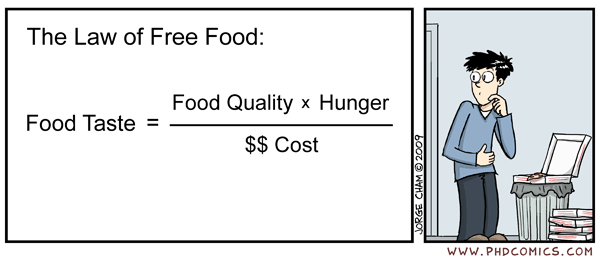Small Steps to Speed Financial Accomplishment
 Earlier this week I shared with you some of the ways my financial situation falls short of my ideals. I know what I should be doing but it seems difficult to actually get it done. I brainstormed a few steps I have taken in the past and should re-apply now. These tweaks are probably most useful for people who keep budgets and are auto-saving but want to find ways to be a bit more aggressive.
Earlier this week I shared with you some of the ways my financial situation falls short of my ideals. I know what I should be doing but it seems difficult to actually get it done. I brainstormed a few steps I have taken in the past and should re-apply now. These tweaks are probably most useful for people who keep budgets and are auto-saving but want to find ways to be a bit more aggressive.
1) Verify that your goals are achievable. Better to accomplish downsized goals than nothing at all.
We can’t all have a million dollars in our retirement accounts by our 30th birthdays, become real estate moguls, and vacation for three months every year in the south of France. Your goals must be reasonable for your current income and life situation. Certainly, try to increase your income and cut spending, but don’t be unrealistic.
Maybe Kyle and I can’t max out our Roth IRAs in 2012, which involves finding another $117 in our monthly budget. But I can probably increase our monthly contribution by $20 or $50 and work on maxing out when our situation changes again.
2) Update your budget.
Kyle and I got small cost-of-living raises in September, and so far the increases have just gone into our leftover “Other” budget category of spending instead of being given a specific job. We need to edit our budget to reflect this slight income increase instead of letting the excess slip away in purposeless spending.
If your budget involves any max-spending categories like ours does, make sure they reflect your current level of spending. If they are a bit high (or low), readjust and redirect the excess money. We installed a fan in our bedroom at the beginning of the summer and used it instead of cranking our A/C. Our peak electricity bill came down about $30 between the summer of 2010 and the summer of 2011. That means we can reduce our power budget to reflect this new maximum and do something else with that money each month.
3) Create a plan for found money and budget leftovers.
Found money is basically any kind of income that you weren’t counting on receiving. Examples are overtime pay, tax refunds, rebates, rewards, bonuses, and cash gifts. Budget leftovers are what I call the money left in our checking account at the end of the month (since some of our budget categories are maximums, we come in under budget most months.). If you have a plan in place for what to do with any extra money that you stick to when the situation arises, you’re sure to use it optimally. The trick is to acknowledge that whatever temptations you might face when you receive the money, you already have decided what the best use is – and to transfer it quickly from checking to savings!
Kyle and I set a goal to buy two new laptops in August 2011 on North Carolina’s tax-free weekend and we contributed all our found money from the whole summer to that account. Between gifts we received for our birthdays and wedding anniversary and credit card cashback rewards (including a sign-up bonus) we were able to buy the laptops almost solely using found money. If we hadn’t had such a singular focus leading up to our goal deadline and had instead spent the money as it came in we wouldn’t have our laptops now.
Currently we are sending all of our found money (mostly credit card rewards) to our Travel account. We are putting all of our budget leftover money toward paying our self-loans from last year back into our nest egg.
4) Find a workaround to get something you like or need at a cheaper price and commit the savings to your goals.
I’m not advocating you completely cut budget categories because I assume you’ve already cut out what you’re willing to. But maybe there is a less expensive way to accomplish the same tasks. Here are some examples from our own life:
- I grew up buying every book I wanted and being slightly afraid of libraries. Now I go to the library as my primary source of books and only buy a book after I know I’ll want to reread it many times or lend it.
- We watch a lot of TV but were troubled by our high cable bills. After a lot of research into how to view our university’s men’s basketball games (a non-negotiable for us!) we were able to cancel our cable and get all of the content we wanted over the internet and over the air with a tiny investment in an antenna.
- When we got married we shopped around for car insurance and bundled all our insurance needs together for a discount instead of staying with either of our previous companies. If you can find a better deal for you same coverage with another company, try renegotiating with your current company or switch over.
- I switched from a brand-name version of the Pill to a generic and my out-of-pocket payment is a third of what it was before. (Be careful in switching medication brands because they are not all created equal and you might need to experiment to find the right one for you.)
There are a multitude of workarounds possible for every budget. Not all of them will be worth pursuing, but each one that does work for you will get your incrementally closer to your goal. The great part about this approach is that you don’t feel deprived so it is more sustainable than cutting something out completely.
5) Go on a fast and commit the savings to your goals.
I’m not necessarily referring to a fast from food here! In fact, that’s one of the last places I would fast. A fast is a good exercise because it can free up a little bit of money but it has a defined end point so your deprivation doesn’t go on forever. For example, you could fast from alcohol, movies in theaters, clothes shopping, or desserts. Just be sure that your fast doesn’t result in 1) a more expensive compensatory habit (ordering appetizers instead of drinks while out at a bar) or 2) pent-up demand for what you passed on before (spending twice your clothes shopping budget once the fast ends). Kyle and I fasted from eating out last August to great success.
Making this list has really motivated me to make these incremental changes to get closer to meeting my goals! I won’t completely rectify what I think is lacking in our financial situation immediately but it sure will get us closer! If you have been inspired too, please post your goal on the One Small Thing Challenge for December so we can encourage one another.
When you feel stuck in your progress to your financial goals, what strategies do you employ to boost your savings rate? What are you going to try out this month? Which financial goals are you most excited about?
photo from johnwilliamsphd
Filed under: budgeting, found money, goals, savings

 One Small Thing Challenge December 2011
One Small Thing Challenge December 2011 Childhood Games Indicating Financial Personality
Childhood Games Indicating Financial Personality The Financial Implications of Dropping One Car
The Financial Implications of Dropping One Car Awesome Financial Benefits to Being a Grad Student (and Terrible Detriments)
Awesome Financial Benefits to Being a Grad Student (and Terrible Detriments)


I usually look over the budget, then start listing potential opportunities to make money or cut spending. I think pick a handful of options that seems promising.